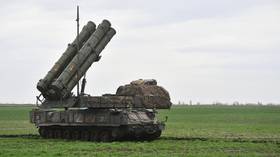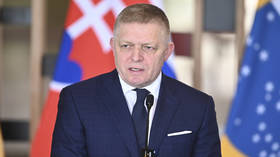Do lockdowns reduce Covid-19 deaths? Russia's experience says perhaps not, as economy defies catastrophic trends seen elsewhere

Like most of Europe, Russia is dealing with a new Covid-19 wave. But it's handling things a little differently. After enforcing one of the strictest lockdowns in the world, last spring, it’s now taking a decidedly softer approach.
Earlier in the year, restrictions were so tight that residents of Moscow were only allowed to visit their nearest shop, with cross city travel heavily limited. Dog owners were granted the right to walk their pets within just 100 meters of their homes. A measure which led to some entrepreneurial types offering to lease pooches to give their neighbours a chance to go outside.
Nationwide, many regions imposed similarly hard limits, with southern Krasnodar, for instance, using a ‘pass system’ to authorize travel even within a short radius.
In recent months, national leaders have rejected suggestions of a second national lockdown, citing mental health and economic concerns, plus a belief that the process might be counterproductive. Thus, Russia now finds itself quietly carving out a unique approach to managing the pandemic. Around the country, pubs and restaurants are open, albeit with earlier closing in many regions, and football games have crowds, restricted to a third of capacity.
Also on rt.com Phase III trial reveals 91.4% efficacy for Russia’s Sputnik V Covid-19 vaccine, with jab '100% effective' against severe casesSince the beginning of the outbreak, more than 70 million people have tested positive for the virus and 1.6 million have been recorded as dying from it across the world. Given the wide variation in testing regimes, the true total is likely far higher. In Russia, according to numbers from the national statistics service, around 151,200 more deaths have been recorded so far this year than for the same time the year prior. This includes figures from October, when an extra 47,777 people died compared to 2019.
While the figures garnered significant attention in the Russian media, and they highlight the human toll of the global pandemic, other nations have been similarly hard hit. England and Wales, for example, only recently emerging from a second national lockdown, have been consistently recording more than 12,000 deaths per week for the most recent weeks available. This puts their monthly figure well within the same ballpark as Russia’s.
France, which also instituted a second shutdown, has seen excess deaths rise to 150 percent in some regions, while 15,000 additional deaths were recorded in one week alone over the summer.
The US, which has had an inconsistent and, at times, contradictory approach to containing the virus, marked by widespread refusal by a vocal minority to follow the rules, has recorded close to 300,000 excess deaths since the start of the pandemic.
Also on rt.com As Sputnik V launches, number of Russians willing to get a Covid-19 jab has DOUBLED in just a couple of months, poll revealsThese approaches differ fundamentally, and Russia’s prohibitions have struck a markedly different tone to the blanket bans advocated by leaders in the UK and France, but it would appear that the outcomes are broadly similar in terms of the scale of deaths.
However, as far back as May, Western media accused Russia of presiding over an ineffective response to the pandemic, with Politico citing “mistrust” and “disorganization” as its defining features. Last month, the Moscow Times, which, despite its name is a Dutch-owned outlet funded by Western governments, asked “is the World Health Organization too soft on Russia?” It argued that the international organization was avoiding criticism of the country’s approach.
Authorities in Moscow have pushed back against negative coverage around their handling of the virus, with President Vladimir Putin’s spokesman Dmitry Peskov saying that governing during the pandemic was a “thankless job,” and that the Kremlin “would hardly agree” with criticism from international outlets.
Much of the focus on Russia’s response comes because authorities have refused to countenance a return to a national lockdown, despite an increasing number of cases. The country’s six-week total shutdown ended in April, with bars, restaurants and other businesses reopening, albeit with social distancing measures in place. Since then, a semblance of normality has returned, with shoppers, diners and drinkers propping up businesses across the country.
Also on rt.com Kremlin dismisses conspiracy theories about Putin hiding from Covid-19 in ‘Sochi bunker,’ says president working in MoscowRussia has spent the intervening period dramatically increasing its testing regime, having now conducted more than 80 million swabs, the vast majority since the summer. In October, as the number of positive results in the country reached another peak, Putin shrugged off calls for a return to lockdown. The president told journalists that, “when it comes to putting in place blanket restrictions: we have no plans to do this.” Instead, he argued, doctors were getting better at treating serious cases of the virus and “there are drugs, medicines and vaccines now appearing.”
Part of the reason for the reluctance of Russian authorities to bring in more stringent measures is the colossal cost of downing tools in sectors like hospitality, retail and professional services. In November, Putin used a virtual meeting of G20 leaders to warn that, because of Covid-19, the world faces a recession “which the modern world has not known since the Great Depression.”
However, Russia’s economy has been less severely affected than states that have put in place more stringent barriers to economic activity during the pandemic. While economists predict that the world’s sixth largest economy - measured by purchasing power parity - will contract by 4.5 percent this year, they expect a virtually complete bounce back by the end of next year.
By contrast, countries such as the UK, which recently emerged from a second lockdown, are facing far more disruption, with the government bracing for an economic blow of almost 11.5 percent. Likewise, France, which has imposed some of the toughest Covid-19 laws, is facing similar levels of decline.
Also on rt.com Russian health watchdog says Covid-19 triggers process of ‘natural selection’ as deaths among elderly and infirm peakBut is the cost of locking down a country worth it, when it comes to the number of people who die from the virus? While the 47,777 extra deaths reported for October compared to 2019 made headlines, it is clear they are not the full story. It is important to note that not all of those who died were direct victims of the virus. Authorities say that Covid-19 played a role in just under half of cases, with the remaining death certificates citing other causes. However, in some instances, these could be people unable to access treatment for chronic conditions as a result of an overburdened healthcare system.
But again, countries like the UK have experienced the same problems, despite national lockdowns intended to prevent hospitals from becoming overstretched. In July, British doctors wrote in The Lancet medical journal that “substantial increases in the number of avoidable cancer deaths in England are to be expected as a result of diagnostic delays due to the Covid-19 pandemic.” Then, in October, French scientists warned that an extra 30,000 people were living with cancers that had gone undetected as a result of the pandemic, despite President Emmanuel Macron’s pledge that lockdowns would prevent hospitals from becoming “submerged.”
While comparing numbers with the world’s largest country is often difficult, deaths in Russia from the virus look less pronounced when compared with other nations. With around 2.5 million known cases, Russia’s mortality rate has hovered around 1.8 percent. By contrast, the UK’s is just above 3.5 percent, meaning Covid-19 patients are almost twice as likely to die compared to those in Russia. France’s rate is also significantly higher, at 2.4 percent, and the country has recorded almost as many positive tests, despite having a population twice as small as Russia’s and weeks of imposed quarantines. However, other countries have fared better, with only one in 100 Covid-19 patients dying of the disease in countries like Taiwan, Venezuela, Israel, Georgia and Lithuania.
However, as in every country, that measure rises among the elderly and those with pre-existing conditions. On Monday, the press service of the Russian Health Ministry told journalists that, for patients with diabetes and those aged over 60, the risk of mortality rises to over 20 percent. It is for this reason that Russia, like other countries, has invested so significantly in expanding hospital capacity. Moscow, for example, constructed entirely new facilities and converted old ones in order to meet demand. However, there are reports that many regions are running out of beds, prompting fears that the death rate could rise if people are unable to access acute care.
Russia’s strategy now appears to be a bid to deploy the world’s first registered vaccine against coronavirus, Sputnik V, before the death toll ticks up much higher, with mass immunization beginning in the capital over a week ago. The UK has followed suit, pinning its hopes on US pharma giant Pfizer’s jab. However, if the approach works and allows for a full return to normality in 2021, it is likely that questions will be asked in London, in Paris, and in countries across the world as to why national lockdowns didn’t seem to have the effect that leaders had promised.
Think your friends would be interested? Share this story!














